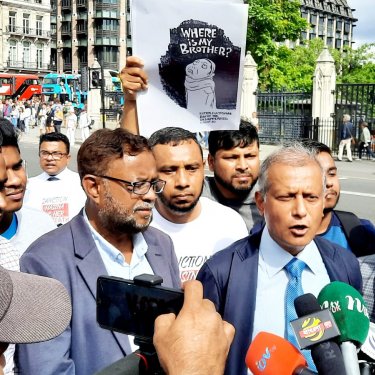Bangladeshi government uses relatives of expatriate journalists as hostages

The brothers of two Bangladeshi expatriate journalists who are critical of the government have been arrested in the past few weeks without any warrant. These arrests constitute grave press freedom violations, Reporters Without Borders (RSF) says.
“In their quest to silence opposition journalism, the Bangladeshi authorities have just imprisoned individuals whose only crime is to be related to a critical journalist,” RSF’s Asia-Pacific desk said. “Such actions are completely unworthy of a government that claims to be democratic. We call on Attorney General A. M. Amin Uddin to put an immediate stop to such harassment of journalists based abroad.”
Around 15 plainclothes policemen went to the home of Nur Alam Chowdhury in the southern district of Noakhali on 13 September and took him away without showing a warrant or explaining why he was arrested.
It was only when he was taken before a court that he learned that he had been arrested because he was the brother of Shamsul Alam Liton, the editor of the Weekly Surma, a Bengali and English-language newspaper based in London.
Chowdhury was detained under Section 54 (1) of the Code of Criminal Procedure, which says a person may be arrested without a warrant in the event of a “reasonable suspicion” of an offence. The police explained that Chowdhury was suspected of a “possible” connection with his brother.
Harassed for denouncing enforced disappearances
A journalist for the past three decades, Liton was President Iajuddin Ahmed’s deputy press secretary from 2003 to 2005 and then joined Weekly Surma, which is very critical of Prime Minister Sheikh Hasina’s government.
On 19 August, he wrote an editorial about money-laundering by Bangladeshi officials and the following week, on International Day of the Disappeared, he organised a demonstration outside the House of Commons in London for the victims of enforced disappearances in Bangladesh. Weekly Surma’s website was then subjected to a wave of cyber-attacks that made it inaccessible.
RSF has seen a report by investigators that describes Liton as “a provocateur and a leader of an anti-government organisation” and claims that Chowdhury was an “accomplice” who “directly and indirectly assisted his brother in spreading anti-government propaganda in many places in Bangladesh.”
Two similar cases a few days apart
Abdul Muktadir Manu, the brother of anther Weekly Surma journalist, Abdur Rob Bhuttow, was arrested at his home in the northeastern town of Moulvibazar on 9 September, just four days before Chowdhury’s arrest. Like Chowdhury, he was arrested under Section 54 (1) of the Code of Criminal Procedure by plainclothesmen. He was released 12 days later.
A Weekly Surma special correspondent, Bhuttow is being targeted for reporting that is critical of the prime minister and intelligence services. In August, he appeared in a Facebook live video with Hasinur Rahman, a former Bangladeshi army lieutenant-colonel who has exposed enforced disappearances carried out by the Directorate-General of Forces Intelligence.
Cases of the authorities using enforced disappearances to harass critics are frequent in Bangladesh. The Dhaka-based photo-journalist Shafiqul Kajol was subjected to a shocking and deeply cynical 53-day enforced disappearance in 2020, as RSF reported at the time. In 2021, RSF reported a surge of acts of intimidation in Bangladesh that are designed to pressure Bangladeshi journalists based abroad.
